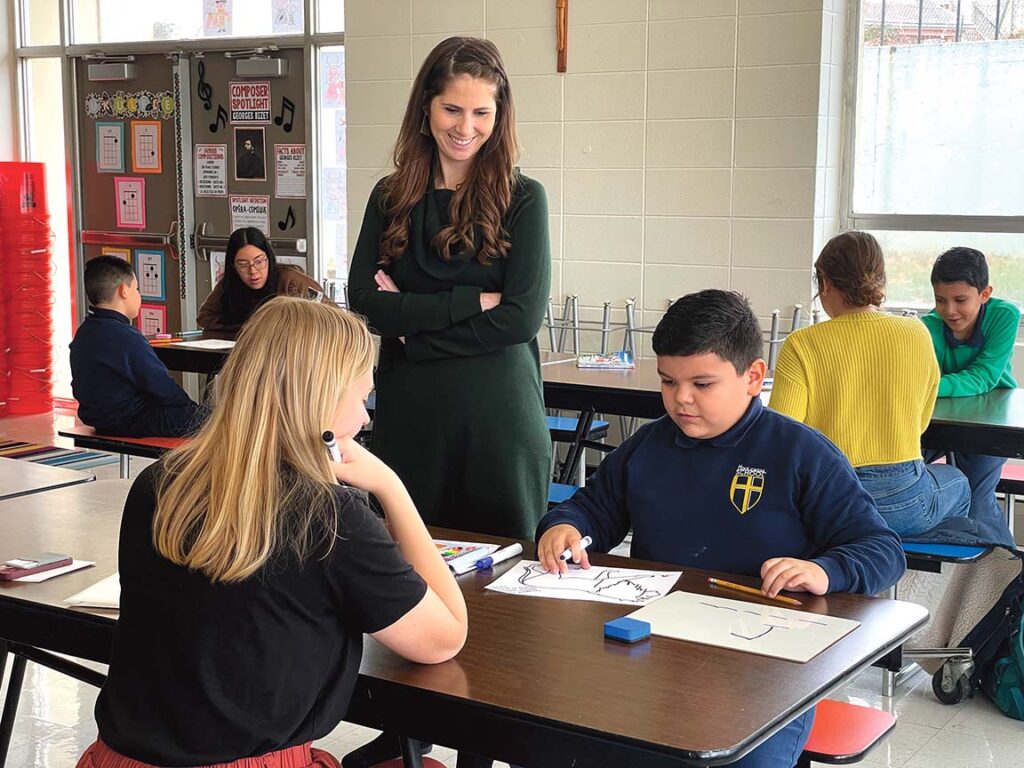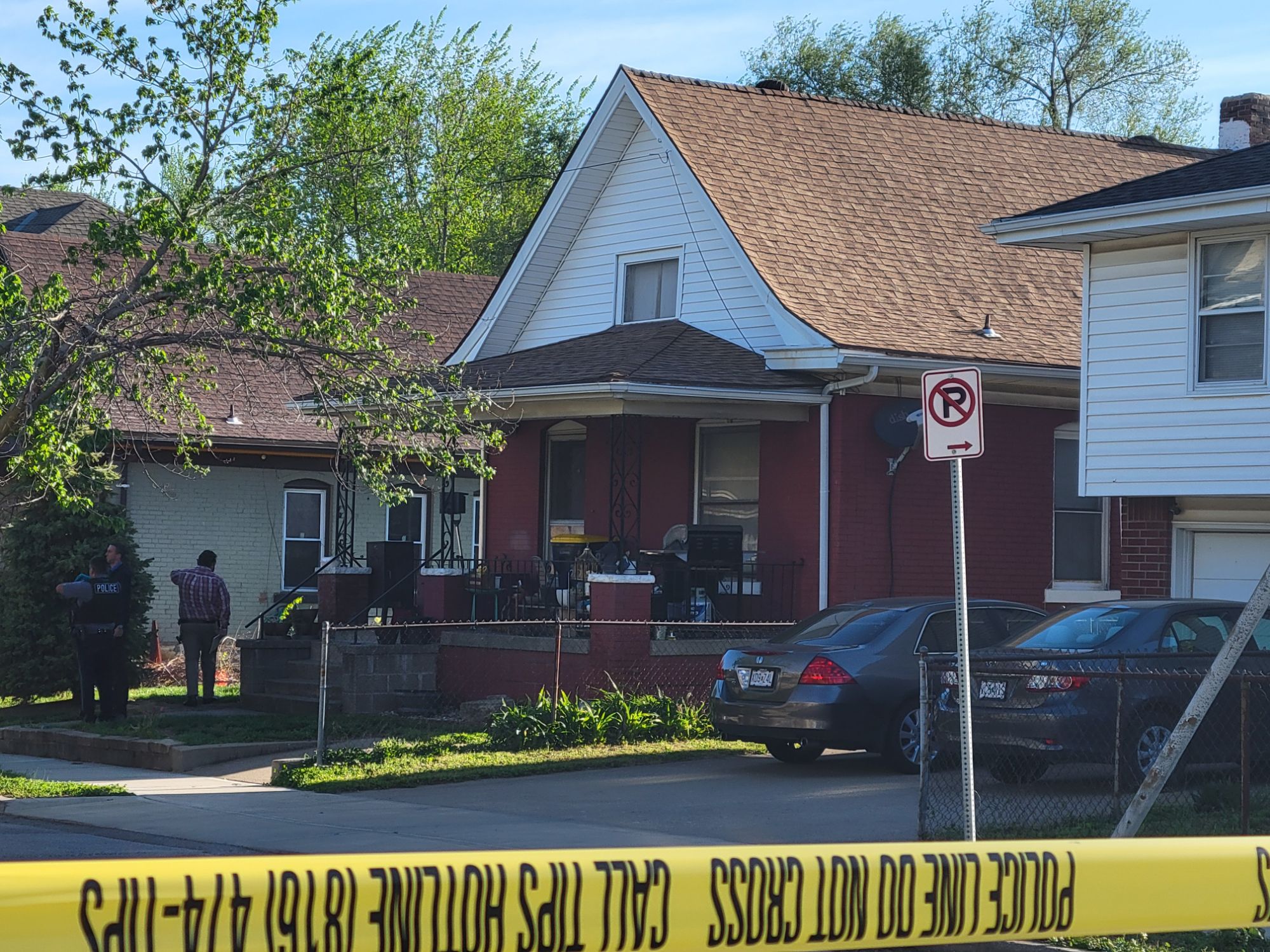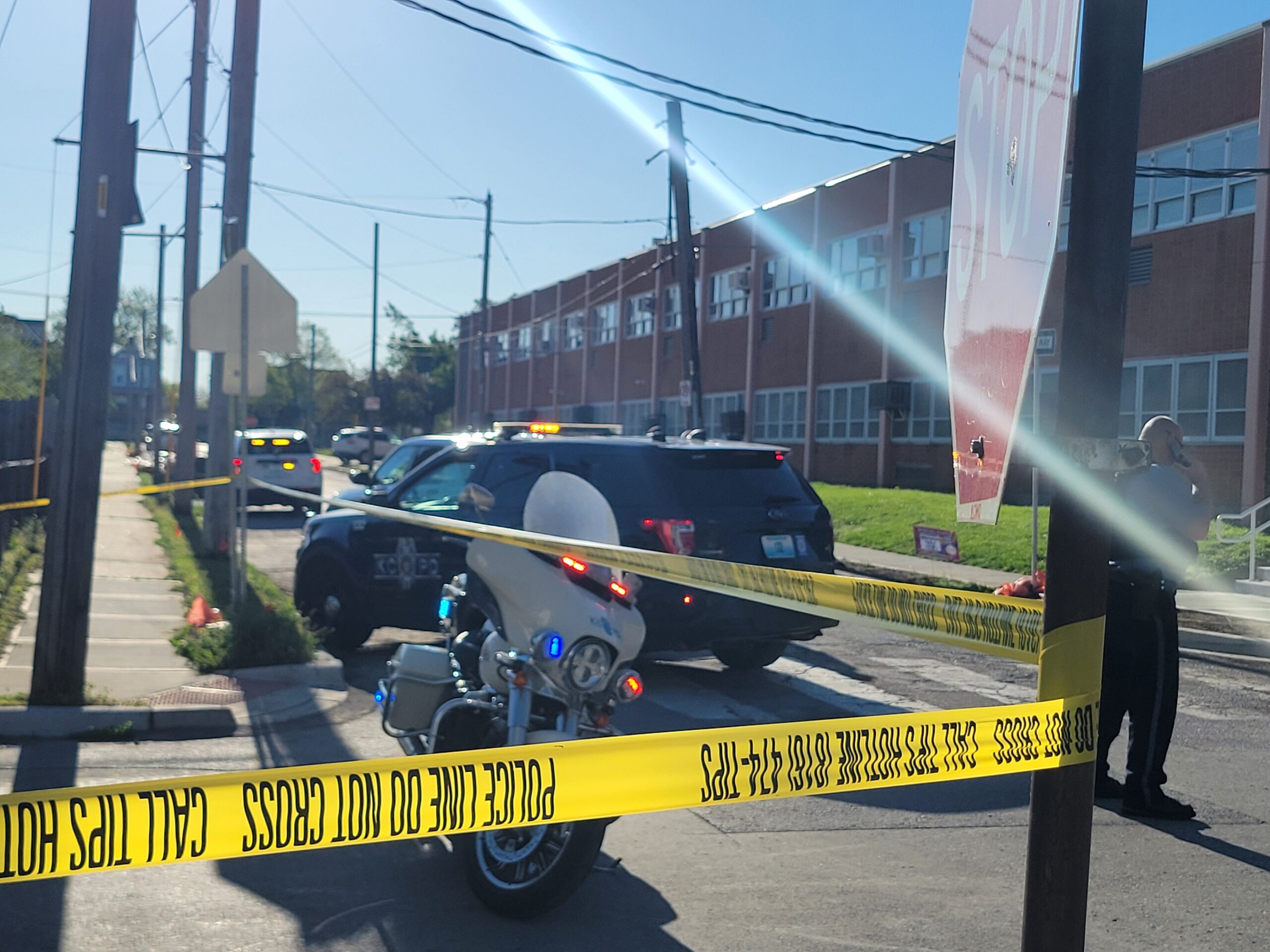
Abby Hoover
Managing Editor
Rockhurst University elementary education students are gaining teaching experience as they work with Holy Cross Catholic School second graders on reading and writing skills.
Hilary Logan, Rockhurst Associate Professor of Education, is in her third year of teaching the class. Her sophomore, junior and senior level students meet with third graders at Holy Cross for an hour each Tuesday, where they are paired with one or two students who they work with throughout the semester.
Logan has taught the class and facilitated the relationship with area schools for three years.
“It’s been a long standing partnership, and we work mostly with the second and third graders in the building,” Logan said, adding that her class worked with the now-third graders last year when they were in second grade.
Dr. Laura Swartz, the literacy profession who started the partnership, has since retired. She handed over the class to Dr. Mandy Sonnenberg, and then it transitioned to Logan.
“They develop lessons for every single session with each student,” Logan said. “It’s based on student need, but it’s also focused on specific reading and writing strategies that we’re learning in the class.”
The particular strategy Logan had them working on last Tuesday had them do student choice based on student need. Some were working on sight words, some were reading books, others used laptops or iPads to assist their lessons.
“In each session, one of the things that we focus on is vocabulary development,” Logan said. “They are English Language Learners, and so one of the things that we noticed is a high need, especially at the elementary level, we need to develop vocabulary, and so they are tasked with every single session doing a vocabulary strategy, a reading comprehension strategy, and then a reading and writing connection so that they’re making sure that they’re doing both the reading portion and the writing connection.”
Many of the families who attend Holy Cross speak English as a second language.
“We learned a bunch of different vocabulary strategies in class, and then they get to pick which vocabulary strategy the students work most efficiently with,” Logan said. “That can be anything from matching vocabulary words to definitions, it can be doing different types of identification, it’s a variety of strategies.”
Early Education students who are specializing in areas like speech disorders get hands-on experience working with real students.
“They get to work with a variety of learners throughout our program, and so the courses that I teach are heavy practicum courses,” Logan said.
She also teaches a course that partners with Visitation Catholic School, which has a much higher socioeconomic status, and she said the students are in a much different mindset. Next semester she hopes they can work with Gordon Parks, a charter school in Midtown, to be able to broaden their experiences and place future teachers in different settings.
“They get to see just the diversity and the student personality, and they get to work in a variety of settings, which is really fun,” Logan said. “My students are learning different teaching strategies, and then they are implementing them in the field.”
“So after this class, we go back to class, we debrief and talk about what went well, what are things that we might need to work on for the next lesson, and then I also teach,” Logan said.
Now, at the end of the semester, students are giving presentations and teaching different reading strategies to each other.
“I’ve seen a lot of growth, just even in this semester alone, in targeting student need in lesson planning and really driving instruction with the development of their lesson planning and their ability to work with students at varying levels,” Logan said. “I think that’s been a huge gain this semester.”
She has also noticed her students’ ability to engage students for a long period of time.
“An hour one-on-one individual session is really challenging, and so making sure that they are providing a lot of different strategies during that time to hit the learning objectives for that particular session is something that they’ve learned,” Logan said. “They just can’t come in and think that one strategy is going to work for that one hour, they really have to be mindful of planning engaging activities. I’ve seen a lot of growth in how they’re planning those engaging activities with their students.”
At the beginning of each semester, the university students do student interest inventories with their paired students to get to know their students, which helps when picking engaging reading materials.
“They get to see them grow and develop over time,” Logan said. “One of the things that we want is for them to continue reading outside of this practicum session. We gift them a children’s book at the end of a session that’s tailored to their particular student, like a Christmas gift. We wrap the books and we give them letters and we give that to them, it’s something really special.”
“I think it’s nice to see them develop,” said Becca Niethe, a sophomore in early education. “We’ve only been here for seven weeks, but I’ve definitely seen progress in their reading skills and their writing and all of that, so it’s been nice.”
Rachel Grable, a sophomore in early education, said the experience is a great way to start her teaching journey by helping them see if it’s something they want to pursue.
“Seeing the progress over time, it’s really rewarding for not only the student, but also for us, to just see them and get excited for them to learn,” Grable said.
Over the past seven weeks, the two small classes have met, getting to know each other.
“Lots of vocabulary has been developed, which is really key, just their understanding and their overall knowledge, and then seeing them have different interest in things and their interest growing and developing on their knowledge of that topic, I do like that,” Grable said. “I can present a new technique of learning vocab or learning how to read or write and they go in like, ‘Oh, I don’t want to do that,’ and then by the end, they’re like, ‘That was so much fun! I had fun reading,’ which is super great for kids to enjoy reading.”
Niethe said that in a classroom, it can be very hard for kids to get the one-on-one time that they need. She knows that sitting down with them for an hour once a week is beneficial.
“Focusing on the student and making sure that they’re getting what they need to develop their thinking further, and for them to just focus is really important, I think,” Grable said. “I love working with them one-on-one for an hour. It will be very rewarding in the end to see their overall progress and how they’ve done throughout the semester.”
Holy Cross Principal Shelley Henn began teaching at the Catholic grade school in 1992. She was the first teacher whose class benefited from the partnership with Rockhurst.
“As soon as we started our partnership with Rockhurst – I was teaching second grade – and so every year the Rockhurst students would come in and work with my second grade class,” Henn said. “This year, the second grade teacher was trying to get all of our kids where they needed to be, so I moved him down from third grade, put him in second grade, so we moved Rockhurst to third grade.”
Henn likes placing the Rockhurst class with a first year teacher because she feels the program benefits the teacher as well.
“I always enjoyed it because I would look at what they were doing and I would get ideas,” Henn said. “I enjoyed it and I could learn from the Rockhurst students because I had been in the classroom forever.”
Teachers notice the sessions impacting the rest of the students’ learning. Henn used the university students’ visits as an opportunity to explain to her young students that they would continue to learn through elementary school, then move on to high school, and could go to college.
“For me, it was a way to promote higher education within the classroom, and the Rockhurst students work one-on-one with the children, so they got to know the kids and the kids got to know the students,” Henn said. “I think that sometimes people don’t have the opportunity to interact with college students or realize that there’s something beyond high school.”
Henn said the program has integrated well into her school over the past 10 years. Last year, despite the pandemic, the partnership continued via Zoom.
“It’s great, they do great things,” Henn said. “COVID was tough. I was in the classroom then and Zoomed, so getting 20 second graders… I would have to log each one of the kids to get ready for the weekly meeting, and at Rockhurst their WiFi was kind of spotty sometimes, so that was fun. It’s much better if they’re in person.”
Holy Cross has remained in session in person since August 2020. Logan said she has noticed at other schools that the mechanics of speech have been impacted by not being able to see and have conversations face-to-face, but Henn believes Holy Cross students didn’t lose a whole lot of learning.
“We closed spring break when the pandemic first occurred, and then we were back the following August,” Henn said. “So we were just out for a few weeks, and we actually weekly prepared folders with assignments, and parents picked those up every week and they brought back the completed assignments every week.”
They provided devices and internet to families without so they could do Zoom calls with students, and held an afternoon homework help session daily.
“I felt like we were pretty successful in the way we handled that because there was still that interaction,” Henn said. “I mean, the parents were just driving by and we’d hand them folders, but the parents were very involved.”
Holy Cross is near capacity in many classrooms, and plans to expand their preschool space with the addition of a new construction building to break ground in the spring.
Henn has never wanted to be anywhere else. However, she recognizes that they have a high turnover rate for first year teachers at Holy Cross.
“We’ll hire first year teachers, and they’ll be here a year or two, and this isn’t what they want to teach,” Henn said. “They’re here just long enough to get a little bit of experience and then go someplace else that they would rather be. So I think for the Rockhurst students, this is an open book. This is what it looks like in the inner city, this is fine. You know that this is exactly what it is.”
Henn thinks it’s important for future teachers to see inside of schools like Holy Cross in communities like Northeast, even though she praises her students for being exceptionally well behaved.
“It’s great – I mean, it really is – I think everybody learns from it and everyone benefits from it,” Henn said. “I think it’s good for both our students and the Rockhurst students… It’s a great big world and the more experiences they have, the better off they are.”
Spanish: https://northeastnews.net/pages/estudiantes-de-la-universidad-de-rockhurst-obtienen-experiencia-como-profesores-en-el-escuela-holy-cross/


















